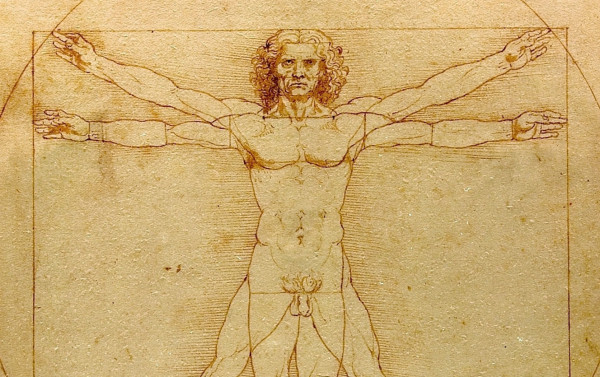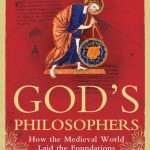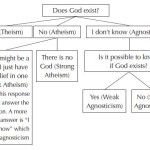Why I Am a Humanist and Not a Catholic
by Todd Stiefel
Filed under Atheism
At age eighteen, I attended an all-boys Catholic high school wearing a gold cross attached to a necklace. Of course, in the homophobic halls of religious instruction, this jewelry would never be called a necklace. We labeled such an adornment with the more macho-sounding “chain.” At the time, the irony of “chaining” myself with a cross was lost on me.
Those were the days of feeling the spirit while attending school-sponsored religious retreats. One was an amazing emotional roller-coaster called “The Encounter.” While there, we were peer-pressured to confess our most painful thoughts publicly, bonding with each other as we shared the darkest parts of our minds. Imagine teen boys dropping their alpha-male facades and crying as we took turns revealing emotional horrors and feelings of inadequacy. The most memorable story was that of a friend revealing his father’s descent into madness.
It was okay, though; the leaders helped rebuild us with Jesus as our support. Plus, we had games and music to lighten the mood. It was a fantastic feeling of brotherhood, being together for something so powerful. Sure, we were all hungry, because little food was provided. We were exhausted as well, because they kept us up late and woke us early. Yet, for a few days, it was worth it to experience spiritual exultation. I most certainly did not see the parallels to the tools of brainwashing...yet.
I found myself believing and praying while my skeptical nature rested in hibernation—not dead but not alert either. I knew that I doubted what I was taught more than most of my friends, and I definitely seemed to ask more questions. I found the answers good enough to put off probing too deeply but poor enough to sustain a lingering sense of uncertainty. My inquiries dodged the big picture and instead focused on pieces of the puzzle. I was up for tackling bizarre, obvious myths of the Old Testament, but I simply was not prepared to dig into the examination of the existence of God. Perhaps this was because my identity included sporting Jesus around my neck.
In hindsight, it appears that my subconscious was already tackling the big question. I clearly recall creating a stir as a result of my salutatorian graduation speech. A part of me spoke the unspoken to a theater full of proud Roman Catholic parents: “Regardless of whether or not you believe in God, someone or something gave us everything we have, made us who we are.” This tribute of gratitude to my parents fascinates me in retrospect. At a time when I still believed in the divine, I used my farewell to Marist Brothers education as an opportunity to project my theistic doubts on the audience. While I was not ready to address the question of whether I believed in God, I was ready to tip the hand of my religious incredulity by recognizing theistic doubt—not in myself, but in the crowd.
It was not long before I began to answer the questions, this time with the benefit of neutral educational resources. As a Duke University undergrad, I chose to take an elective in Old Testament history. I was amazed to hear many things that were never presented in my four years of required religious study during high school. It seemed more than coincidence that I had not been taught about the ancient pagan origins of many of the Bible stories, let alone how some of the exact phrases in the Old Testament are taken from previously existing myths. I found out that there is absolutely no extra-biblical evidence for the Jewish enslavement in Egypt or the Exodus.
My Catholic education certainly did not teach me about how the Ugarit gods were inherited by the early Israelites. I had not been taught how the Jewish Yahweh was closely associated with El, the king of the Ugarit pantheon. It was at Duke that I first learned that El ruled over a court of less powerful deities in just the way Psalm 82 speaks of Yahweh ruling over an assembly of lesser gods.
I was shocked to learn that my Yahweh was simply one of many competing local Middle-Eastern war gods, different primarily in that his adherents switched from polytheism to monotheism. I learned that this process started in order to promote the idea that Yahweh was superior to the many other gods mentioned in the Bible. Eventually, it led to a denial of the existence of other gods altogether. These monotheistic religious memes were violently intolerant of other gods and beliefs, which made them far superior in demanding replication of themselves and the destruction of opposing memes.
I asked myself how I came to believe in Yahweh. I realized it was simply an accident of history. The Israeli god’s followers slaughtered their enemies and spread their religion by forceful intolerance of other faiths. Which god the Israelites believed in did not matter; he was just one of thousands. If a different tribe had been more successful, their invisible lord would have been the one that survived to be adopted by the early Christians. In turn, if Constantine had chosen a different deity to inspire his soldiers to conquest, Christianity would not have flourished in the Roman Empire.
I came to understand that my god was simply the one that had been passed down to me by my ancestors. I was the descendant of people who had been subjugated by followers of El/Yahweh/Jesus. My god was not even the original one; he was just the modern form of gods that had merged and evolved over millennia. He was a god that was predated by the gods of hundreds of cultures. My god was younger than the pyramids. I had always accepted that all other religions simply believed in false deities that had been handed down to them. I finally recognized that my religion was no different. Catholicism is no more true or false than any other religion.
After my Old Testament course, I embraced the term agnostic. I looked on the world with fresh eyes, free from the bias of religious presumption. I was enlightened. But I was also disgusted. Free from my rose-colored faith goggles, I was better able to see the tragedies created by religious extremism. I was horrified by the offenses of the Vatican. I seriously considered founding a religion without dogma, supernaturalism, or authority.
A decade after I became an agnostic, I was turned on to the writings of the “new atheists” by a customer of my family’s business. I realized that the word atheist applied to me as well. I had not known if there was a god or not, but I had also not believed that there was. I continued my reading and found that the religion I had considered founding already existed. It was not a religion at all; it was an alternative: humanism. I had been a humanist for over ten years without even knowing that there was a word for my belief system.
Humanism exchanges fear for a free mind. It rejects religion’s hunger for power and instead empowers the individual. It condemns theocracy and embraces secularism. Humanists are accountable to humanity, not to a deity. We give our lives meaning through how we live them. We reject violence as a means to spread beliefs. Humanism respects people, not ideas. We accept science, not supernaturalism. Humanism flourishes with free inquiry at the expense of dogma. We thrive on love, equality, and compassion.
Ultimately, I am not a Catholic because I am a humanist.
Related Posts
Note: Our goal is to cultivate serious and respectful dialogue. While it's OK to disagree—even encouraged!—any snarky, offensive, or off-topic comments will be deleted. Before commenting please read the Commenting Rules and Tips. If you're having trouble commenting, read the Commenting Instructions.













